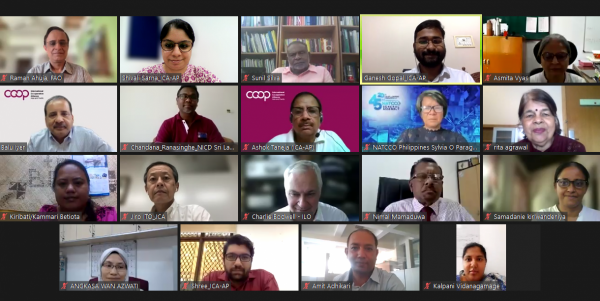
On 2nd July 2022, cooperatives worldwide celebrated the 100th International Day of Cooperatives (#CoopsDay). This year also marks the 10th anniversary of the UN International Year of Cooperatives (IYC, 2012).
#CoopsDay is celebrated annually on the first Saturday of July by cooperatives across the world since 1923. It aims to increase awareness of cooperatives and promote the ideas of international solidarity, economic efficiency, equality, and world peace. Since 1995, the ICA and the UN through the Committee for the Promotion and Advancement of Cooperatives (COPAC) have jointly set the theme for the celebration of #CoopsDay.
#CoopsDay 2022 theme – “Cooperatives Build a Better World” re-emphasised the theme of IYC – “Cooperative Enterprises Build a Better World." It showcased how our human-centred business model, inspired by the cooperative values of self-help, self-responsibility, democracy, equality, equity, and solidarity and the ethical values of honesty, openness, social responsibility and caring for others, is building a better world.
To mark these historic milestones, ICA-AP Regional Office organised a Panel discussion to map the growth trajectory of the cooperative movement in the Asia and Pacific region since IYC, 2012. The panel discussion was organised in two panels with eight guest speakers comprising representatives from cooperative leaders and representatives of Government and International Bodies working closely with cooperatives.
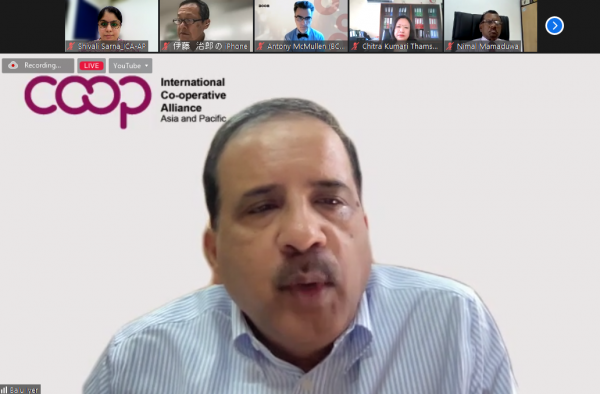
Mr. Balasubramanian Iyer, Regional Director, ICA-AP in his welcome address said, before IYC, the world was coming out of the financial turbulence of 2008 and cooperatives were seen to provide some hope for citizens around the world. In the last decade, between 2012 and 2022, cooperatives have progressed at various levels. Internationally, the work of cooperatives has been recognized in the voluntary national reviews (VNRs) on the implementation of the Sustainable Development Goals (SDGs) of several countries. In 2016, UNESCO added cooperatives to the list of intangible cultural assets; cooperatives were described as entities that allow for community building through shared interests and values and help create innovative solutions to societal problems. The resolutions and conclusions from the 110th International Labor Conference on Decent Work and Social and Solidarity Economy (SSE) explicitly mention cooperatives in the definition of SSEs. Citing examples from India, Iran, Malaysia, and a few other countries, he said that many governments have recognized cooperatives as vehicles to enhance contribution to the GDP. The 2021 world cooperative monitor documents the role of cooperatives in addressing the needs of the community during the pandemic and mentions that action by cooperatives spread a more sustainable and more inclusive economic model.
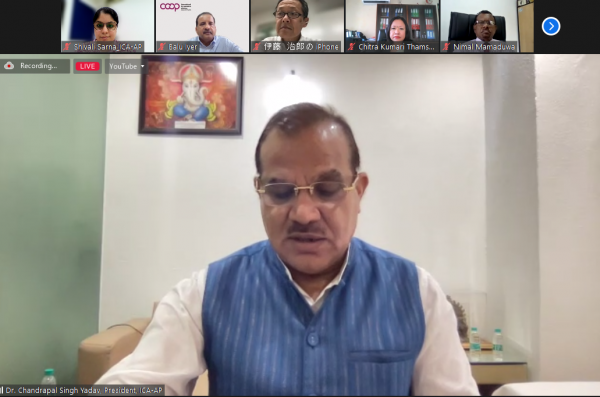
Dr. Chandrapal Singh Yadav, President, ICA-AP shared his opening remarks and said time and again cooperatives have come together during the crisis to pool their resources and stand in solidarity with fellow cooperators both locally and internationally. Be it the natural disasters in the Asia-Pacific region or the Covid-19 pandemic crisis, cooperatives have collectively supported those affected by the outbreak. As values-based enterprises and based on principles of democratic and participatory governance, member engagement, and concern for community, cooperatives reflect the values of a community. He said that cooperatives have been continuously helping in creating a better world by providing decent jobs, members’ economic participation, capacity building, resource generation, community social responsibility, and leadership development in various sectors of livelihood - agriculture and allied, forestry, textile, banking and credit, housing and healthcare, insurance, workers and industrial and consumer sectors. Citing examples from various countries, Dr. Yadav, reiterated that policymakers and governments have been recognising the contribution of cooperatives worldwide. He said cooperatives must adopt changes concerning technology, digitalization and innovation to stay useful and relevant to the changing needs of their members. He called upon cooperators to come together in furthering the spirit of cooperation and continue building a better world.
The first panel discussed the country-specific examples of how cooperatives as human-centered businesses address socio-economic development issues, contribute to the achievement of SDGs, and help build resilience among communities during a crisis. The panelists also shared how the cooperative movement in their countries has grown after the IYC.
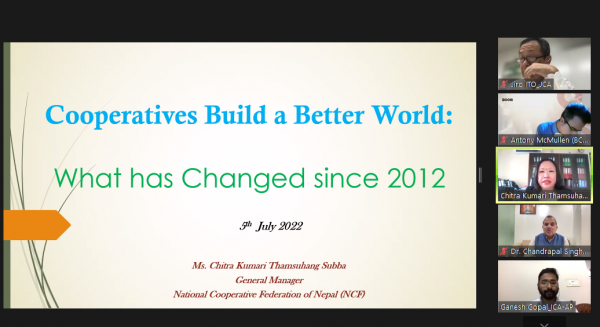
Ms. Chitra Kumari Thamsuhang Subba, General Manager, National Cooperative Federation of Nepal (NCFN) presented the growth in cooperatives, from around 23,000 in 2012 to more than 30,000 in 2022; and the increase in members from 3.1 million to 7.3 million today. The constitution of Nepal recognises cooperatives as one of the important pillars along with the public and private sectors for the economic development of the country. Cooperatives have actively contributed to women's empowerment, income generation, leadership development, and creating employment opportunities for communities. One of the major achievements has been the development of a formal cooperative education curriculum at both school and university levels. Staying true to their identity, cooperatives have supported communities in rescue and rehabilitation efforts during the devastating earthquake in 2015 and the Covid-19 pandemic. Cooperatives in Nepal also actively contribute to the implementation of SDGs as the government considers them a strategic partner. NCF, Nepal has developed SDG implementation guidelines for all levels of cooperatives which is reflected in the VNRs of Nepal in 2017 and 2020.
Mr. Jiro Ito, Managing Director, Japan Co-operative Alliance (JCA) presented the role of Japanese coops to build a better world. He shared that many Japanese cooperatives have been represented in the ICA World Cooperative Monitor rankings. After IYC, many reforms have taken place like the amendment of the Agricultural Coop Law after the Agricultural (Coop) Reform (2014), the establishment of the Japan Co-operative Alliance (JCA) in April 2018, and the passing of the Workers' Cooperative Law in December 2020. The last 10 years have not been smooth for Japan due to the Great Japan Earthquake in 2011 followed by Tsunami and an accident at the nuclear power plant. Local people and cooperatives were hit hard, but cooperative members from all over the country regardless of area or sector came together for relief and reconstruction efforts. He mentioned that ever since the establishment of JCA, they have seen an increase in efforts from cooperatives to solve local challenges and contribute to SDGs. The Senior Managing Director of JCA has been selected as a member of the roundtable on SDG promotion. A representative from the government of Japan is presenting at the Committee for the Promotion and Advancement of Cooperatives (COPAC) side event during the UN High-level Political Forum on Sustainable Development 2022.
Mr. Antony McMullen, Director and Secretary of Co-operative Bonds in Australia represented the Business Council of Co-operatives and Mutuals (BCCM) and presented the role of cooperatives in the achievement of SDGs in Australia. He shared how cooperatives as values-based businesses conduct themselves with honesty, care for others, and a sense of social responsibility. A distinct feature is that cooperatives are not owned by distant shareholders; they're owned by members who don’t do anything to make money but make money to do something! He explained how cooperatives and mutual enterprises (CMEs) are helping Australians meet current and future challenges in areas of affordable housing, renewable energy, climate change, affordable aged care, worker rights in the gig economy, indigenous employment and food security. Using examples, he explained the contribution of CMEs in SDGs 13, 11, 10, 8, 3, and 2. He mentioned that CMEs are focusing on environment, social, and governance (ESG) reporting. According to Ms. Melina Morrison, CEO, BCCM these ESG frameworks are backed into the CME model of business. CMEs in Australia know that the health of their community is equal to the health of their business. Since IYC, 2012, CMEs in Australia have increased their combined annual turnover from $105.25bn to $203bn AUD. Today, there are 1,832 CMEs with 76,000 employees and 31.7mn members.
The second panel comprised of Mr. Faizal Khan, Director & Registrar, Department of Cooperative Business (DCB), Ministry of Industry, Trade and Tourism Fiji; Mr. Fuad Kharmah, Head, Project Department, Cooperative Work Agency (CWA), Palestine; Mr. Charles Bodwell, Enterprise Specialist, ILO in East, Southeast Asia and the Pacific; and Mr. Raman Ahuja, National Expert - Value Chains, the Food and Agriculture Organization (FAO), India. They discussed the roles and initiatives of the government and international bodies in creating an enabling environment for cooperatives.
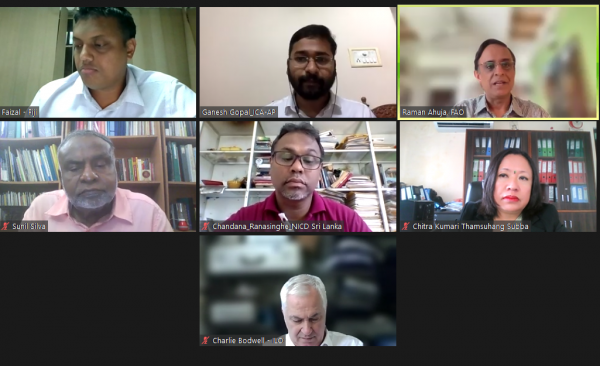
Mr. Faizal Khan discussed how the cooperative movement in Fiji has withstood the test of time and the focus has shifted from consumer cooperatives to agro-producer cooperatives with a focus now on the value chains. Cooperatives have diversified into other sectors, and the participation of youth and women continues to grow. Today, around 430 strong and vibrant cooperatives hold around 133 million worth of assets in Fiji. He said that policymakers have played a pivotal role in promoting and establishing an enabling environment for cooperatives. It was done by providing access to finance at the grassroots level, handholding services by the Ministry, and cooperative-based trainings through the Cooperative College of Fiji. The government is focusing more on strategic partnerships with development agencies such as FAO, ILO, UNCDF, etc. He said that DCB used IYC as a launchpad to create more awareness about cooperatives among Parliamentarians and in the remotest communities. The department relied on a mix of traditional and mass media like newspapers and radio, conducted face-to-face dialogues, school awareness programs, etc. In the last 3 years, 40 new cooperatives have registered with DCB. Mr. Faizal mentioned the Target 100’ initiative by the Fijian government, launched in January 2018 to assist and guide 100 cooperatives across Fiji to be fully compliant with the Cooperatives Act is evidence that strong governance structures and compliance with the act can lead to the success of the cooperative movement in Fiji.
Mr. Raman Ahuja discussed how FAO as a member of COPAC plays an important role in promoting and strengthening cooperatives. He said cooperatives have been more resilient internationally to economic shocks and to the climate crises that we are experiencing. Cooperatives have proved to be essential pillars for delivering food and nutritional security and contributing to the overall agriculture development in India and across the globe. Coops have moved beyond traditional agri and credit services and now deliver multiple services across value chains in multiple sectors and by technology infusion. Mr. Ahuja explained that the UN Decade of Family Farming (UNDFF) aims at strengthening family farming and promoting diversified and innovative agri-food systems. All the seven pillars of UNDFF are contributing to the 2030 agenda and are fully consistent with the spirit and guiding principles
of the SDG framework. He mentioned how the Ministry of Cooperation, Government of India is aggressively utilising the opportunity and rolling out multiple initiatives to strengthen the cooperative movement in India. One of many such initiatives is the allocation of about 350 million USD for the digitization of 63,000 primary agricultural cooperative societies (PACS) in India.
Mr. Fuad Kharmah discussed how the 100 years old cooperative movement in Palestine has helped the communities fare through times of conflict and crisis. Housing cooperatives have been instrumental in providing decent housing in the remotest areas even during conflict situations. The most important achievement for cooperatives in Palestine has been the enactment of the 2017 law as a result of the collaboration of the government with the ILO and the cooperative sector. The law stipulated the establishment of CWA which serves both as a regulatory and promoting body for cooperatives in Palestine. CWA also focuses on inducing finance to cooperatives by setting cooperative development funds and providing capacity-building services.
Mr. Charles Bodwell discussed the ILO’s Recommendation 193 on the Promotion of Cooperatives. This year also marks the 20th anniversary of ILO Recommendation 193. He said that ILO 193 promoted the concept of decent work within cooperatives, the concept of fair wages, secure jobs, and social protection. Laying special emphasis on Cooperative Principle 5 - Education, Training, and Information, he said there is a need to shift the focus of training and education from highly capacitated highly resourced institutions to simpler activity-based learning tools and programs that allow people to learn from each other, guided by materials. Our.Coop developed by ILO is a low-cost, easy-to-use training program for those interested in starting, launching and managing a cooperative in a participatory and efficient manner. The program has been pilot tested with rural workers, informal economy workers, disadvantaged youth, and women artisans across Asia, Africa, the Middle East and the Americas through ongoing development cooperation projects implemented by the ILO. Mr. Charles said that one of the strengths of the cooperative movement is that it's always grounded in the communities in which they operate. The project Local Economic Empowerment Program (LEEP) by ILO in Sri Lanka has helped the fishing communities with marketing and fair-trade labelling to promote their exports. Cooperatives are important in improving the living and working conditions of women and men globally even in areas neglected by the state and investor-driven enterprises.
The country-specific cases and the views of the 2nd panel were well received by the participants who engaged in interesting discussions with the panelists. Mr. Iyer shared his closing remarks and said we are being once again called upon to step up and address the needs of members and communities and the presentations and panel discussions showed that we are doing that, but we still need to do more. He thanked the presenters, panelists, and participants for their active participation.
The event can be rewatched on the ICA-AP YouTube channel.



